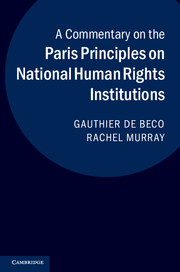Book contents
- Frontmatter
- Contents
- Foreword
- List of abbreviations
- Part I Background: history and challenges
- Part II Commentary principle by principle
- 3 Competence
- 4 Mandate
- 5 Pluralism and representativeness
- 6 Independence
- 7 Working methods and strategy
- 8 Quasi-judicial powers
- 9 Stakeholders
- Part III Twenty years later: the future of the Paris Principles
- Annex I Principles relating to the status of national institutions (The Paris Principles)
- Annex II ICC General observations as at May 20131
- Bibliography
- Index
- References
3 - Competence
from Part II - Commentary principle by principle
Published online by Cambridge University Press: 05 November 2014
- Frontmatter
- Contents
- Foreword
- List of abbreviations
- Part I Background: history and challenges
- Part II Commentary principle by principle
- 3 Competence
- 4 Mandate
- 5 Pluralism and representativeness
- 6 Independence
- 7 Working methods and strategy
- 8 Quasi-judicial powers
- 9 Stakeholders
- Part III Twenty years later: the future of the Paris Principles
- Annex I Principles relating to the status of national institutions (The Paris Principles)
- Annex II ICC General observations as at May 20131
- Bibliography
- Index
- References
Summary
COMPETENCE AND RESPONSIBILITIES
1. A national institution shall be vested with competence to promote and protect human rights.
2. A national institution shall be given as broad a mandate as possible,which shall be clearly set forth in a constitutional or legislative text, specifying its composition and its sphere of competence.
Definition
The Paris Principles do not provide a definition for the term “NHRI”. They simply state that “a national institution shall be vested with competence to promote and protect human rights”. There is, therefore, no model for NHRIs, something which has been recognised by the UN General Assembly.
Instead of providing a generic definition, most scholars define NHRIs by enumerating the type of bodies that qualify. There is however still disagreement on which bodies should be included, especially as far as ombudsman institutions are concerned.
The SCA does not provide a definition as such, but states that it is “aware of the different [NHRI] structural models in existence including: commissions; ombudsman institutes; hybrid institutions; consultative and advisory bodies; research institutes and centres; civil rights protectors; public defenders; and parliamentary advocates”. For theOHCHR,“[NHRIs] are State bodies with a constitutional and/or legislative mandate to promote and protect human rights. They are part of the State apparatus and are funded by the State”. In view of this, while the boundaries of the term still must be clearly established, an NHRI has, at least, certain essential characteristics. NHRIs are public bodies that are independent bodies created and, in principle, funded by the State, as indicated by the OHCHR. This means that an entity cannot claim to be an NHRI if its establishment does not result from a legal act by the State, that is, a decision taken by its legislative power. However, its relationship with government (including its independence from it), any quasi-judicial role and the extent of its mandate can vary, and yet still an institution can be classified as being compliant with the Paris Principles.
- Type
- Chapter
- Information
- Publisher: Cambridge University PressPrint publication year: 2014



